- Home
- Roald Dahl
The Collected Short Stories of Roald Dahl Volume 2 Page 2
The Collected Short Stories of Roald Dahl Volume 2 Read online
Page 2
Mike, I noticed, was lounging in his chair, apparently unconcerned, but he was watching every move. Mrs Schofield, the wife, sat prim and upright at the other end of the table, looking straight ahead, her face tight with disapproval. The daughter, Louise, had shifted her chair away a little, and sidewise, facing the gourmet, and she, like her father, was watching closely.
For at least a minute, the smelling process continued; then, without opening his eyes or moving his head, Pratt lowered the glass to his mouth and tipped in almost half the contents. He paused, his mouth full of wine, getting the first taste; then, he permitted some of it to trickle down his throat and I saw his Adam's apple move as it passed by. But most of it he retained in his mouth. And now, without swallowing again, he drew in through the lips a thin breath of air which mingled with the fumes of the wine in the mouth and passed on down into his lungs. He held the breath, blew it out through his nose, and finally began to roll the wine around under the tongue, and chewed it, actually chewed it with his teeth as though it were bread.
It was a solemn, impressive performance, and I must say he did it well.
"Urn," he said, putting down the glass, running a pink tongue over his lips, "Urn—yes. A very interesting little wine gentle and gracious, almost feminine in the after-taste."
There was an excess of saliva in his mouth, and as he spoke he spat an occasional bright speck of it on to the table.
"Now we can start to eliminate," he said. "You will pardon me for doing this carefully, but there is much at stake. Normally I would perhaps take a bit of a chance, leaping forward quickly and landing right in the middle of the vineyard of my choice. But this time—I must move cautiously this time, must I not?" He looked up at Mike and he smiled, a thick-lipped, wet-lipped smile. Mike did not smile back.
"First, then, which district in Bordeaux does this wine come from? That's not too difficult to guess. It is far too light in the body to be from either St Emilion or Graves . It is obviously a MŽdoc. There's no doubt about that.
"Now—from which commune in MŽdoc does it come? That also, by elimination, should not be too difficult to decide. Margaux? No. It cannot be Margaux. It has not the violent bouquet of a Margaux. Pauillac? It cannot be Pauillac, either. It is too tender, too gentle and wistful for Pauillac. The wine of Pauillac has a character that is almost imperious in its taste. And also, to me, a Pauillac contains just a little pith, a curious dusty, pithy flavour that the grape acquires from the soil of the district. No, no. This—this is a very gentle wine, demure and bashful in the first taste, emerging shyly but quite graciously in the second. A little arch, perhaps, in the second taste, and a little naughty also, teasing the tongue with a trace, just a trace of tannin. Then, in the after-taste, delightful—consoling and feminine, with a certain blithely generous quality that one associates only with the wines of the commune of St Julien. Unmistakably this is a St Julien."
He leaned back in his chair, held his hands up level with his chest, and placed the fingertips carefully together. He was becoming ridiculously Pompous, but I thought that some of it was deliberate, simply to mock his host. I found myself waiting rather tensely for him to go on. The girl Louise was lighting a cigarette. Pratt heard the match strike and he turned on her, flaring suddenly with real anger. "Please!" he said. "Please don't do that! It's a disgusting habit, to smoke at table!"
She looked up at him, still holding the burning match in one hand, the big slow eyes settling on his face, resting there a moment, moving away again, slow and contemptuous. She bent her head and blew out the match, but continued to hold the unlighted cigarette in her fingers.
"I'm sorry, my dear," Pratt said, "but I simply cannot have smoking at table."
She didn't look at him again.
"Now, let me see—where were we?" he said. "Ah, yes. This wine is from Bordeaux , from the commune of St Julien, in the district of MŽdoc. So far, so good. But now we come to the more difficult part—the name of the vineyard itself. For in St Julien there are many vineyards, and as our host so rightly remarked earlier on, there is often not much difference between the wine of one and wine of another. But we shall see."
He paused again, closing his eyes. "I am trying to establish the 'growth'," he said. "If I can do that, it will be half the battle. Now, let me see. This wine is obviously not from a first-growth vineyard nor even a second. It is not a great wine. The quality, the—the—what do you call it?—the radiance, the power, is lacking. But a third growth—that it could be. And yet I doubt it. We know it is a good year—our host has said so—and this is probably flattering it a little bit. I must be careful. I must be very careful here."
He picked up his glass and took another small sip.
"Yes," he said, sucking his lips, "I was right. It is a fourth growth. Now I am sure of it. A fourth growth from a very good year from a great year, in fact. And that's what made it taste for a moment like a third—or even a second-growth wine. Good! That's better! Now we are closing in! What are the fourth-growth vineyards in the commune of St Julien?"
Again he paused, took up his glass, and held the rim against that sagging, pendulous lower lip of his. Then I saw the tongue shoot out, pink and narrow, the tip of it dipping into the wine, withdrawing swiftly again—a repulsive sight. When he lowered the glass, his eyes remained closed, the face concentrated, only the lips moving, sliding over each other like two pieces of wet, spongy rubber.
"There it is again!" he cried. "Tannin in the middle taste, and the quick astringent squeeze upon the tongue. Yes, yes, of course! Now I have it! The wine comes from one of those small vineyards around Beychevelle. I remember now. The Beychevelle district, and the river and the little harbour that has silted up so the wine ships can no longer use it. Beychevelle… could it actually be a Beychevelle itself? No, I don't think so. Not quite. But it is somewhere very close. Ch‰teau Talbot? Could it be Talbot? Yes, it could. Wait one moment."
He sipped the wine again, and out of the side of my eye I noticed Mike Schofield and how he was leaning farther and farther forward over the table, his mouth slightly open, his small eyes fixed upon Richard Pratt.
"No. I was wrong. It is not a Talbot. A Talbot comes forward to you just a little quicker than this one; the fruit is nearer the surface. If it is a '34, which I believe it is, then it couldn't be Talbot. Well, well. Let me think. It is not a Beychevelle and it is not a Talbot, and yet—yet it is so close to both of them, so close, that the vineyard must be almost in between. Now, which could that be?"
He hesitated, and we waited, watching his face. Everyone, even Mike's wife, was watching him now. I heard the maid put down the dish of vegetables on the sideboard behind me, gently, so as not to disturb the silence.
"Ah!" he cried. "I have it! Yes, I think I have it!"
For the last time, he sipped the wine. Then, still holding the glass up near his mouth, he turned to Mike and he smiled, a slow, silky smile, and he said, "You know what this is? This is the little Ch‰teau Branaire-Ducru."
Mike sat tight, not moving.
"And the year, 1934."
We all looked at Mike, waiting for him to turn the bottle around in its basket and show the label.
"Is that your final answer?" Mike said.
"Yes, I think so."
"Well, is it or isn't it?"
"Yes, it is."
"What was the name again?"
"Ch‰teau Branaire-Ducru. Pretty little vineyard. Lovely old ch‰teau. Know it quite well. Can't think why I didn't recognize it at once."
"Come on, Daddy," the girl said. "Turn it round and let's have a peek. I want my two houses."
"Just a minute," Mike said. "Wait just a minute." He was sitting very quiet, bewilderedlooking, and his face was becoming puffy and pale, as though all the force was draining slowly out of him.
"Michael!" his wife called sharply from the other end of the table. "What's the matter?"
"Keep out of this, Margaret, will you please."
Richard Pratt was looking at
Mike, smiling with his mouth, his eyes small and bright. Mike was not looking at anyone.
"Daddy!" the daughter cried, agonized. "But, Daddy, you don't mean to say he guessed it right!"
"Now, stop worrying, my dear," Mike said. "There's nothing to worry about."
I think it was more to get away from his family than anything else that Mike then turned to Richard Pratt and said, "I'll tell you what, Richard. I think you and I better slip off into the next room and have a little chat."
"I don't want a little chat," Pratt said. "All I want is to see the label on that bottle." He knew he was a winner now; he had the bearing, the quiet arrogance of a winner, and I could see that he was prepared to become thoroughly nasty if there was any trouble. "What are you waiting for?" he said to Mike. "Go on and turn it round."
Then this happened: the maid, the tiny, erect figure of the maid in her white-and-black uniform, was standing beside Richard Pratt, holding something out in her hand. "I believe these are yours, sir," she said.
Pratt glanced around, saw the pair of thin horn-rimmed spectacles that she held out to him, and for a moment he hesitated. "Are they? Perhaps they are, I don't know."
"Yes, sir, they're yours." The maid was an elderly woman—nearer seventy than sixty—a faithful family retainer of many years' standing. She put the spectacles down on the table beside him.
Without thanking her, Pratt took them up and slipped them into his top pocket, behind the white handkerchief.
But the maid didn't go away. She remained standing beside and slightly behind Richard Pratt, and there was something so unusual in her manner and in the way she stood there, small, motionless and erect, that I for one found myself watching her with a sudden apprehension. Her old grey face had a frosty, determined look, the lips were compressed, the little chin was out, and the hands were clasped together tight before her. The curious cap on her head and the flash of white down the front of her uniform made her seem like some tiny, ruffled, white-breasted bird.
"You left them in Mr Schofield's study," she said. Her voice was unnaturally, deliberately polite. "On top of the green filing cabinet in his study, sir, when you happened to go in there by yourself before dinner."
It took a few moments for the full meaning of her words to penetrate, and in the silence that followed I became aware of Mike and how he was slowly drawing himself up in his chair, and the colour coming to his face, and the eyes opening wide, and the curl of the mouth, and the dangerous little patch of whiteness beginning to spread around the area of the nostrils.
"Now, Michael!" his wife said. "Keep calm now, Michael dear! Keep calm!"
Lamb to the Slaughter
THE room was warm and clean, the curtains drawn, the two table lamps alight—hers and the one by the empty chair opposite. On the sideboard behind her, two tall glasses, soda water, whisky. Fresh ice cubes in the Thermos bucket.
Mary Maloney was waiting for her husband to come home from work.
Now and again she would glance up at the clock, but without anxiety, merely to please herself with the thought that each minute gone by made it nearer the time when he would come. There was a slow smiling air about her, and about everything she did. The drop of the head as she bent over her sewing was curiously tranquil. Her skin—for this was her sixth month with child—had acquired a wonderful translucent quality, the mouth was soft, and the eyes, with their new placid look, seemed larger, darker than before.
When the clock said ten minutes to five, she began to listen, and a few moments later, punctually as always, she heard the tyres on the gravel outside, and the car door slamming, the footsteps passing the window, the key turning in the lock. She laid aside her sewing, stood up, and went forward to kiss him as he came in.
"Hullo, darling," she said.
"Hullo," he answered. She took his coat and hung it in the closet. Then she walked over and made the drinks, a strongish one for him, a weak one for herself; and soon she was back again in her chair with the sewing, and he in the other, opposite, holding the tall glass with both his hands, rocking it so the ice cubes tinkled against the side.
For her, this was always a blissful time of day. She knew he didn't want to speak much until the first drink was finished, and she, on her side, was content to sit quietly, enjoying his company after the long hours alone in the house. She loved to luxuriate in the presence of this man, and to feel—almost as a sunbather feels the sun that warm male glow that came out of him to her when they were alone together. She loved him for the way he sat loosely in a chair, for the way he came in a door, or moved slowly across the room with long strides. She loved the intent, far look in his eyes when they rested on her, the funny shape of the mouth, and especially the way he remained silent about his tiredness, sitting still with himself until the whisky had taken some of it away.
"Tired, darling?"
"Yes," he said. "I'm tired." And as he spoke, he did an unusual thing. He lifted his glass and drained it in one swallow although there was still half of it, at least half of it, left. She wasn't really watching him but she knew what he had done because she heard the ice cubes falling back against the bottom of the empty glass when he lowered his arm. He paused a moment, leaning forward in the chair, then he got up and went slowly over to fetch himself another.
"I'll get it!" she cried, jumping up.
"Sit down," he said.
When he came back, she noticed that the new drink was dark amber with the quantity of whisky in it.
"Darling, shall I get your slippers?"
She watched him as he began to sip the dark yellow drink, and she could see little oily swirls in the liquid because it was so strong.
"I think it's a shame," she said, "that when a policeman gets to be as senior as you, they keep him walking about on his feet all day long."
He didn't answer, so she bent her head again and went on with her sewing; but each time he lifted the drink to his lips, she heard the ice cubes clinking against the side of the glass.
"Darling," she said. "Would you like me to get you some cheese? I haven't made any supper because it's Thursday."
"No," he said.
"If you're too tired to eat out," she went on, "it's still not too late. There's plenty of meat and stuff in the freezer, and you can have it right here and not even move out of the chair."
Her eyes waited on him for an answer, a smile, a little nod, but he made no sign.
"Anyway," she went on, "I'll get you some cheese and crackers first."
"I don't want it," he said.
She moved uneasily in her chair, the large eyes still watching his face. "But you must have supper. I can easily do it here. I'd like to do it. We can have lamb chops. Or pork. Anything you want. Everything's in the freezer."
"Forget it," he said.
"But, darling, you must eat! I'll fix it anyway, and then you can have it or not, as you like."
She stood up and placed her sewing on the table by the lamp.
"Sit down," he said. "Just for a minute, sit down."
It wasn't till then that she began to get frightened.
"Go on," he said. "Sit down."
She lowered herself back slowly into the chair, watching him all the time with those large, bewildered eyes. He had finished the second drink and was staring down into the glass frowning.
"Listen," he said, "I've got something to tell you."
"What is it, darling? 'What's the matter?"
He had become absolutely motionless, and he kept his head down so that the light from the lamp beside him fell across the upper part of his face, leaving the chin and mouth in shadow. She noticed there was a little muscle moving near the corner of his left eye.
"This is going to be a bit of a shock to you, I'm afraid," he said. "But I've thought about it a good deal and I've decided the only thing to do is tell you right away. I hope you won't blame me too much."
And he told her. It didn't take long, four or five minutes at most, and she sat very still through it all, watching h
im with a kind of dazed horror as he went further and further away from her with each word.
"So there it is," he added. "And I know it's kind of a bad time to be telling you, but there simply wasn't any other way. Of course I'll give you money and see you're looked after. But there needn't really be any fuss. I hope not anyway. It wouldn't be very good for my job."
Her first instinct was not to believe any of it, to reject it all. It occurred to her that perhaps he hadn't even spoken, that she herself had imagined the whole thing. Maybe, if she went about her business and acted as though she hadn't been listening, then later, when she sort of woke up again, she might find none of it had ever happened.
"I'll get the supper," she managed to whisper, and this time he didn't stop her.
When she walked across the room she couldn't feel her feet touching the floor. She couldn't feel anything at all—except a slight nausea and a desire to vomit. Everything was automatic now—down the stairs to the cellar, the light switch, the deep freeze, the hand inside the cabinet taking hold of the first object it met. She lifted it out, and looked at it. It was wrapped in paper, so she took off the paper and looked at it again.
A leg of lamb.
All right then, they would have lamb for supper. She carried it upstairs, holding the thin bone-end of it with both her hands, and as she went through the living-room, she saw him standing over by the window with his back to her, and she stopped.
"For God's sake," he said, hearing her, but not turning round. "Don't make supper for me. I'm going out."
At that point, Mary Maloney simply walked up behind him and without any pause she swung the big frozen leg of lamb high in the air and brought it down as hard as she could on the back of his head.

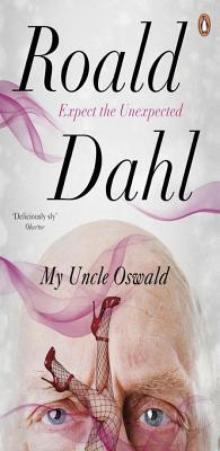 My Uncle Oswald
My Uncle Oswald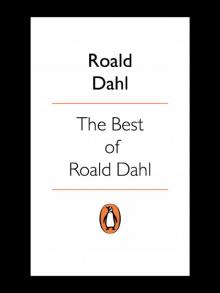 The Best of Roald Dahl
The Best of Roald Dahl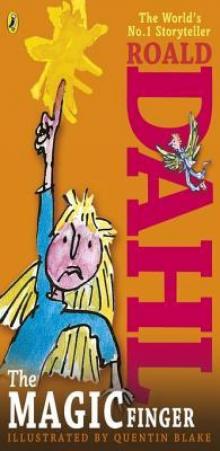 The Magic Finger
The Magic Finger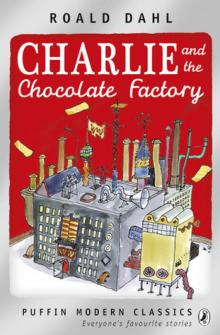 Charlie and the Chocolate Factory
Charlie and the Chocolate Factory Fantastic Mr Fox
Fantastic Mr Fox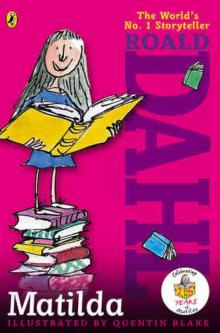 Matilda
Matilda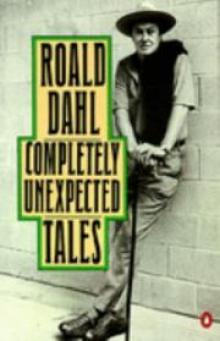 Completely Unexpected Tales: Tales of the Unexpected. More Tales of the Unexpected
Completely Unexpected Tales: Tales of the Unexpected. More Tales of the Unexpected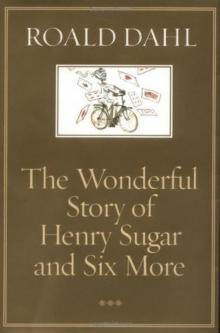 The Wonderful Story of Henry Sugar and Six More
The Wonderful Story of Henry Sugar and Six More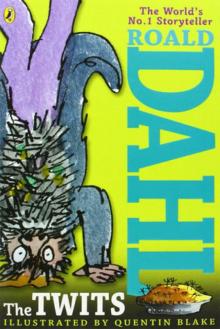 The Twits
The Twits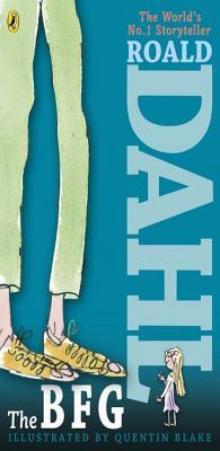 The BFG
The BFG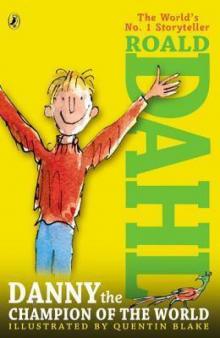 Danny the Champion of the World
Danny the Champion of the World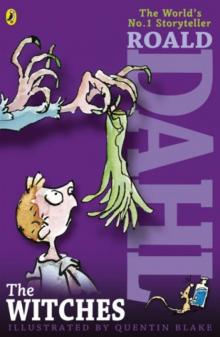 The Witches
The Witches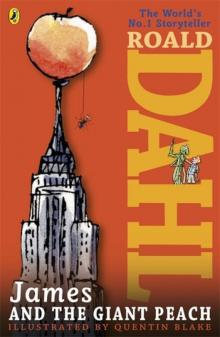 James and the Giant Peach
James and the Giant Peach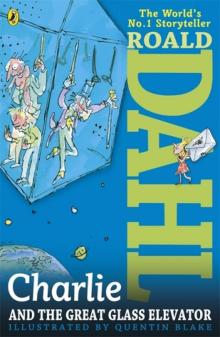 Charlie and the Great Glass Elevator
Charlie and the Great Glass Elevator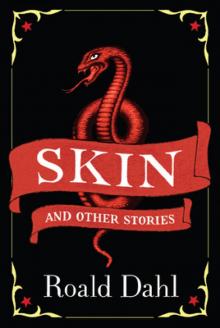 Skin and Other Stories
Skin and Other Stories Kiss Kiss
Kiss Kiss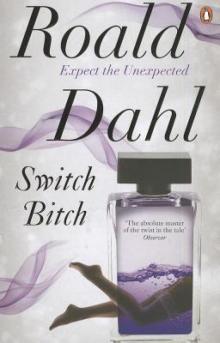 Switch Bitch
Switch Bitch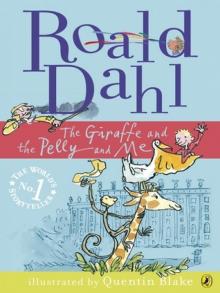 The Giraffe and the Pelly and Me
The Giraffe and the Pelly and Me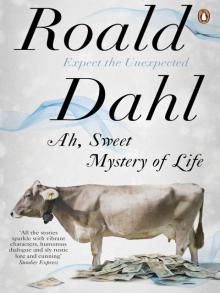 Ah, Sweet Mystery of Life
Ah, Sweet Mystery of Life Fear
Fear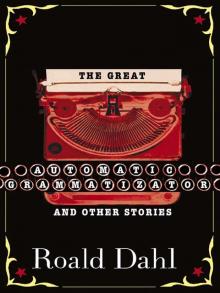 The Great Automatic Grammatizator and Other Stories
The Great Automatic Grammatizator and Other Stories Someone Like You
Someone Like You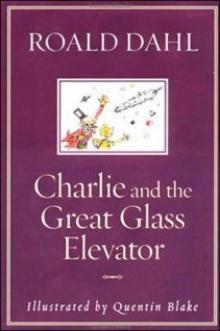 Charlie and the Great Glass Elevator c-2
Charlie and the Great Glass Elevator c-2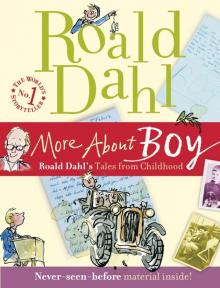 More About Boy
More About Boy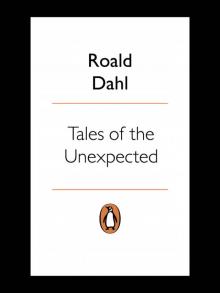 Tales of the Unexpected
Tales of the Unexpected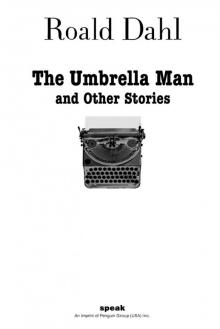 The Umbrella Man and Other Stories
The Umbrella Man and Other Stories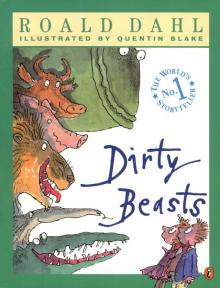 Dirty Beasts
Dirty Beasts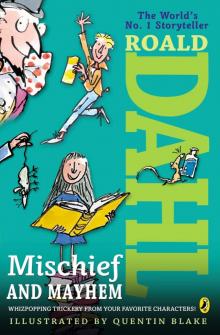 Roald Dahl's Mischief and Mayhem
Roald Dahl's Mischief and Mayhem The Collected Short Stories of Roald Dahl, Volume 1
The Collected Short Stories of Roald Dahl, Volume 1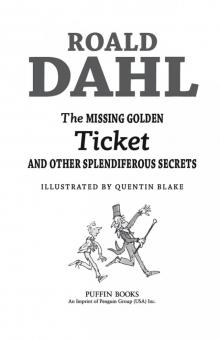 The Missing Golden Ticket and Other Splendiferous Secrets
The Missing Golden Ticket and Other Splendiferous Secrets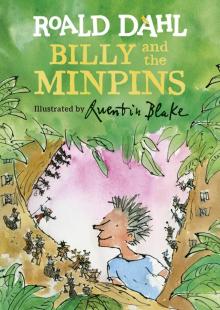 Billy and the Minpins
Billy and the Minpins Over to You
Over to You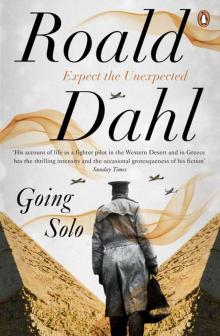 Going Solo
Going Solo Deception
Deception War
War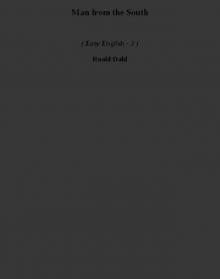 Man from the South ee-3
Man from the South ee-3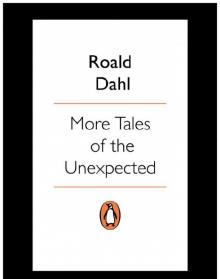 More Tales of the Unexpected
More Tales of the Unexpected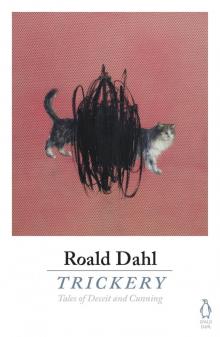 Trickery
Trickery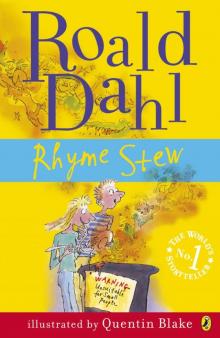 Rhyme Stew
Rhyme Stew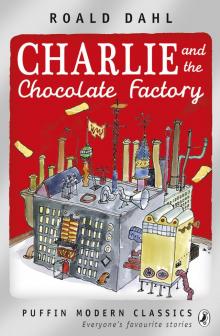 Charlie and the Chocolate Factory (Puffin Modern Classics relaunch)
Charlie and the Chocolate Factory (Puffin Modern Classics relaunch)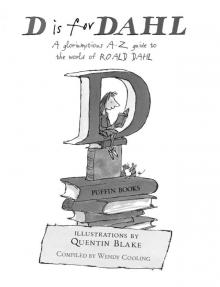 D is for Dahl
D is for Dahl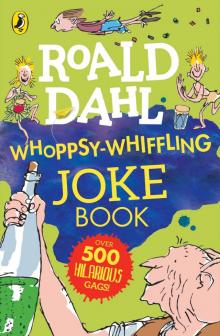 Roald Dahl Whoppsy-Whiffling Joke Book
Roald Dahl Whoppsy-Whiffling Joke Book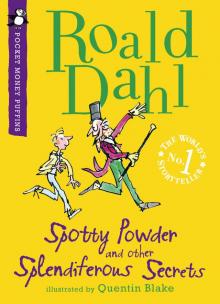 Spotty Powder and other Splendiferous Secrets
Spotty Powder and other Splendiferous Secrets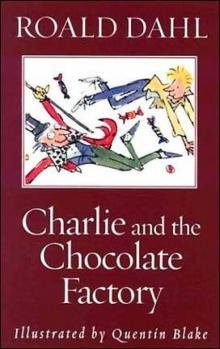 Charlie and the Chocolate Factory c-1
Charlie and the Chocolate Factory c-1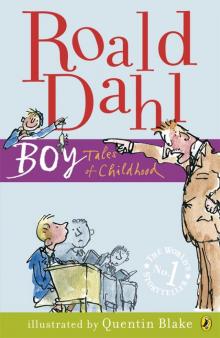 Boy
Boy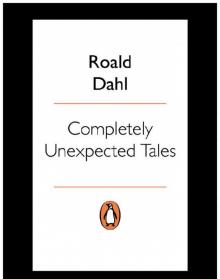 Completely Unexpected Tales
Completely Unexpected Tales Madness
Madness Innocence
Innocence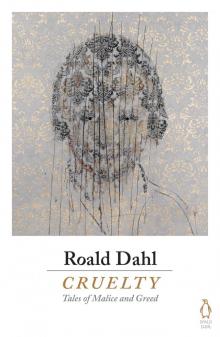 Cruelty
Cruelty George's Marvellous Medicine
George's Marvellous Medicine